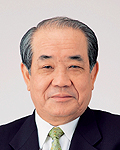
Vice Chairman of the Board of Councillors, Keidanren
Chairman & CEO, Asahi Group Holdings, Ltd.
 |
Hitoshi OGITA Vice Chairman of the Board of Councillors, Keidanren Chairman & CEO, Asahi Group Holdings, Ltd. |
This year marks the fortieth anniversary of the normalization of Sino-Japanese relations, and while Confucius says in The Analects that at the age of forty one's confusion is cleared, much confusion still surrounds relations between Japan and China.
At the National People's Congress (NPC) in March, Premier Wen Jiabao announced that China aims to achieve economic growth of 7.5% this year, indicating that the emphasis from now on will be on stability and the quality of growth. China will also have a new leader this autumn. If growth is to be maintained, the new leader of this great power will have to continue to steer a course of international cooperation. Having grown to become the "workshop of the world" through a focus on added-profit trade powered by labor-intensive industry, however, China will also experience a variety of rapid and complex structural changes over the next decade as it confronts challenges such as the destructive environmental effects of development, the projected decline of its labor force within the next few years, and the emergence of an increasingly borderless economy.
The time has also come for the development of a new partnership in Sino-Japanese relations over the coming decade. We must move beyond the traditional focus on friendship to develop stronger ties leading to more mutually beneficial relations. Government leaders use the phrase "mutually beneficial relationship based on common strategic interests" to describe the Sino-Japanese relationship, and we need to find more concrete ways of developing such a relationship. While at the political level relations can sometimes be a struggle for prestige, people in the private sector tend to be more pragmatic and frank with one another. The first thing that needs to be done, therefore, is to strengthen interaction in the private sector and economic sphere.
In the years ahead, China is likely to see a shift from a state-led heavy industrial orientation to growth in retail, transport, services, and so on in the private sector. Having trodden exactly the same path, there will be many areas in which we will be able to work together with our Chinese counterparts. The business world thus has a major role to play in building a new relationship between Japan and China.
There is a saying in China that goes, "When you drink the water, remember with gratitude the man who dug the well." And now is the time for us to sink a new well and develop a new partnership between Japan and China founded on mutually beneficial relations.